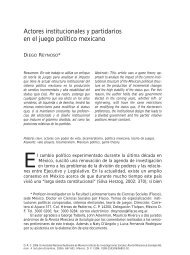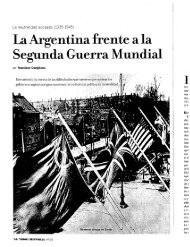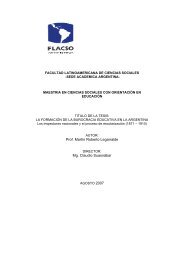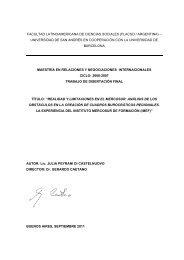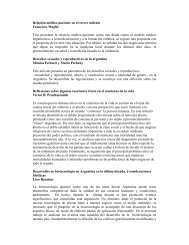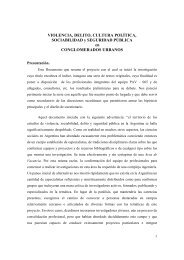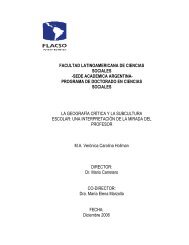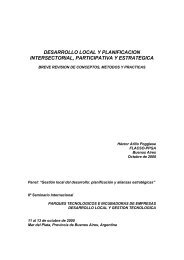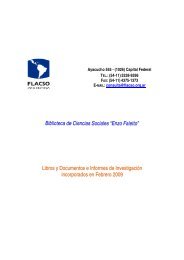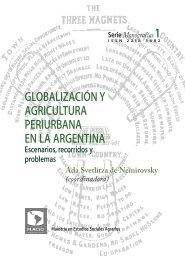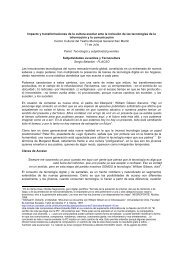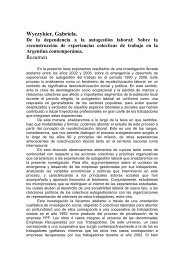Mercedes Botto Andrea Carla Bianculli - Flacso
Mercedes Botto Andrea Carla Bianculli - Flacso
Mercedes Botto Andrea Carla Bianculli - Flacso
You also want an ePaper? Increase the reach of your titles
YUMPU automatically turns print PDFs into web optimized ePapers that Google loves.
5. SOME FINAL REMARKS<br />
The case selection focused on two key moments in the process of trade liberalization launched by<br />
Argentina in the mid-1980s. The first episode, which took place in 1988, was a process of gradual<br />
change, where trade liberalization would be promoted through a strategy of selective integration<br />
with Brazil. The second episode refers to the negotiation initiated in 1991, and which was intended<br />
to attain an indiscriminate and abrupt liberalization by means of the integration process within<br />
Mercosur. This would finally lead to the establishment of a customs union. Comparison between<br />
these two episodes of policy change turns out to be of interest since they both show contrasting<br />
results in terms of the academic influence on the decision-making process. While in the first case<br />
study, academy had a rather important impact on the definition of the strategy and the final<br />
mechanism that would promote sectoral integration, in the second case, academic production, even<br />
if larger in number, had no impact on the final negotiation.<br />
Five main conclusions emerge from this comparative analysis. In the first place, the window of<br />
opportunity opened for the influence of local academia was relatively small. During the<br />
liberalization process initiated in the 1980s, the influence of academia has been only relative and has<br />
remained circumscribed to the implementation of the new policy paradigm. As the trade<br />
liberalization process advanced, the episodes and window of opportunities for the participation of<br />
academia tend to reduce and diminish. In this sense, the comparative analysis shows a larger<br />
participation of the academia in terms of the definition of the strategy and the mechanisms in the<br />
first episode, than in the second one, where academic production regarding trade policy issues was<br />
largely limited to the design of the CET. Certainly, this is not an unimportant aspect since it would<br />
contribute to the definition of which sectors or companies would be the losers and winners within<br />
this new phase of the integration process.<br />
Secondly, the analysis of these two episodes provides strong evidence regarding the different roles<br />
academia and empirical research can play in terms of the trade policy decision-making process. The<br />
most well-known role refers to providing information and proposing alternative solutions to the<br />
given problems, either by means of academic or technical knowledge, or through argumentation.<br />
Academia can also contribute with its ability to favour dialogue between the different stakeholders<br />
by providing a neutral arena for the debate of conflictive interests – being the CGP a good example<br />
of this. A third contribution refers to the fact that empirical research can give voice or amplify the<br />
demands of those sectors traditionally disregarded, and bring to light the darkest and most secret<br />
aspects of trade negotiations. This role is found – though still at an embryonic stage – in the CET<br />
debate and negotiation, where academic production legitimized the participation of new public and<br />
private actors – namely, the Ministry of Foreign Affairs and the chamber of chemical and<br />
petrochemical industries, respectively – in a process that until then had remained circumscribed to<br />
the Ministry of Economy. Closely related to this, the two cases under examination portray the<br />
different ways in which research can turn out be of use to policy-makers, and influence thus their<br />
decisions.<br />
38


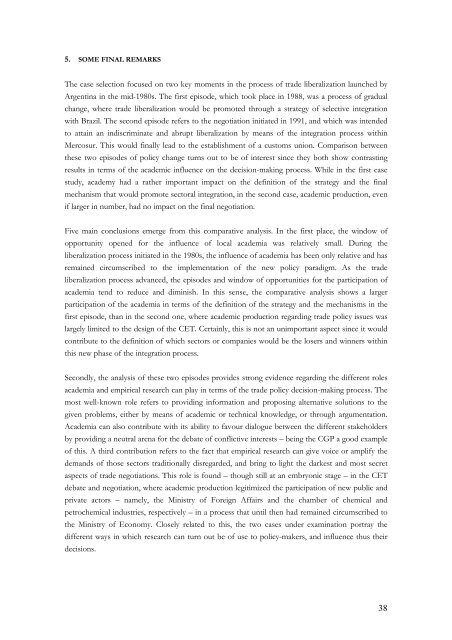
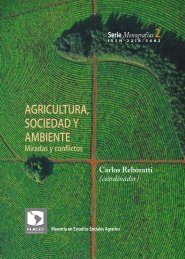
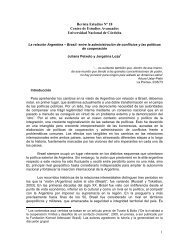
![[P] Disertacion.Melisa.Galvano.pdf - Flacso](https://img.yumpu.com/14596629/1/184x260/p-disertacionmelisagalvanopdf-flacso.jpg?quality=85)
